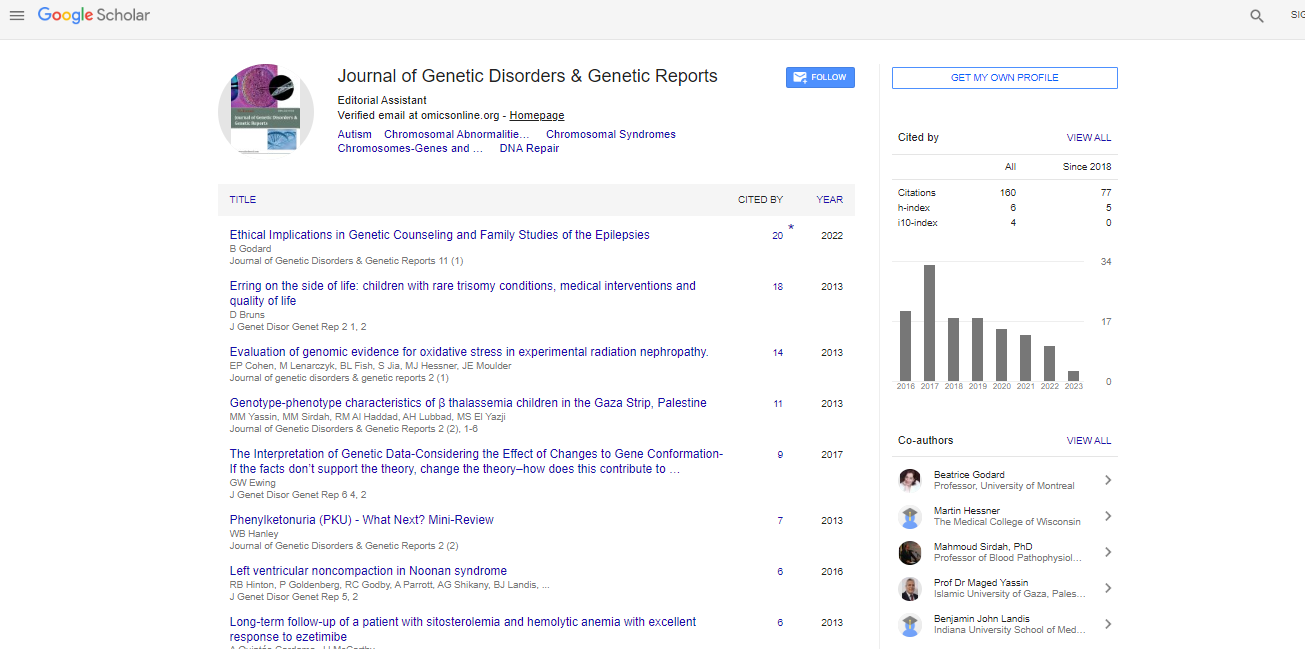Commentary, J Genet Disor Genet Rep Vol: 10 Issue: 6
Chromosomal Disorders
Jobia Alex*
Department of Gynecology, United Kingdom Metropolitan Geriatric Medical Center, UK
*Corresponding author: Jobia A, Department of Gynecology, United Kingdom, Metropolitan Geriatric Medical Center, UK; E-mail: Joal285.com
Received date: June 04, 2021; Accepted date: June 17, 2021; Published date: June 28, 2021
Keywords: Chromosomal Disorders
Introduction
Chromosomal disorders, of which mongolism is that the commonest, can cause multi-domain disability. Additionally, compared to the general population, there is a better frequency of death before the age. In many settings, large gaps in data availability have hampered policy-making, programme priorities and resource allocation for these important conditions. We’ve developed methods, which overcome this lack of knowledge and permit estimation of the burden of affected pregnancies and their outcomes in several settings worldwide. For the methods include an easy equation relating the share of mothers 35 and over to mongolism birth prevalence. The results obtained provide a start line for consideration of services which will be implemented for the care and prevention of those disorders. Chromosomal disorders are caused by changes occurring in either chromosome number or structure usually during the formation of gametes or soon after fertilization. These changes can affect the autosomes or the sex chromosomes (XX in females, XY in males), with chromosomal disorders divided into the 2 corresponding groups. Most autosomal disorders cause death before the age of 5 years or multi-domain disability. However, the supply of appropriate medical aid in high-income settings means there are fewer deaths in those with mongolism before the age of 5 Disorders of the sex chromosomes have a lesser effect on survival but can cause infertility, congenital malformations like congenital heart condition in Turner syndrome also as having neurodevelopmental and psychological impacts. The incidence of major chromosome abnormalities in newborns is about 0.7 percent and increases with maternal age. Amniocentesis is that the commonest invasive prenatal procedure for the detection of fetal chromosomal abnormalities. Amniocentesis may be a relatively safe procedure and fetal loss associated with amniocentesis is about 0.5%. A complicated maternal age is that the most typical reason for using amniocentesis. Utilization of amniocentesis thanks to abnormal fetal ultrasound findings has increased recently. Fluorescence in situ hybridization (FISH) is currently a robust tool within the world of prenatal cytogenetics. amount of amniocentesis procedures in Japan is about ten thousand once a year and it's generally recognized to be a superb benefit for pregnant women who have a risk of fetal chromosomal abnormalities. Our observation that the majority chromosomal abnormalities were autosomal reciprocal balanced translocations is vital because these translocations are known to scale back fertility and should be transmitted in balanced or unbalanced form to subsequent generation. Moreover, approximately 32% of all pregnancies in patients with an autosomal reciprocal balanced translocation may end during a miscarriage . If the pregnancy is ongoing and if the translocation is inherited by the kid, there's an increased risk of congenital anomalies and retardation (11). Calculation of the precise genetic risk of transmission of reciprocal translocations is possible only through empiric models that are different and specific for each translocation. Last, the results of this study suggest that the prevalence of autosomal balanced rearrangements is significantly increased in female partners of couples treated with IVF or ICSI as compared with controls. Because these abnormalities, if transmitted, can cause infertility or congenital anomalies and retardation within subsequent generation, we recommend chromosomal investigations within the feminine partner before the start of IVF or ICSI. If an abnormal karyotype is detected, accurate guidance should be provided and prenatal or preimplantation diagnosis should be offered. Congenital chromosomal abnormalities are the immediate explanation for diseases in man like mongolism (mongolism), but primary etiologic mechanisms haven't been firmly documented. The hypothesis that immunologic perturbations, including autoimmunity in parents, predisposes them to possess children with chromosomal aberrations receives some support from observations of increased frequency of thyroid "autoimmunity" in mothers of subjects with mongolism If, in fact, immunologic disorders contribute to chromosomal abnormalities in gametes or early embryos, they'll also do so in adult somatic cells. Investigation of this hypothesis in man is difficult because the acceptable target tissues are relatively inaccessible. For this reason we explored the likelihood that New Zealand Black (NZB) mice might be used as an experimental model during which to research relationships between immunologic perturbations and chromosomal aberrations. Since, additionally to autoimmunity, this strain features a high incidence of malignancy, it provides a possible opportunity to review associations between immunologically mediated chromosome anomalies and neoplasia ("immunologic ontogenesis") bulk of NZB mice spontaneously develop autoimmune (Coombs positive) hemolytic anaemia and a few have circulating antinuclear antibodies that probably contribute to the "immune complex" nephritis also found in these animals Ageing NZB mice even have a high incidence of lymph reticular malignancy and it's been suggested that 90% of them may develop reticulum cell neoplasia. We examined NZB and two other strains of mice--SJL/J established by Murphy .which also features a high incidence of reticulum cell neoplasia and immunological aberrations, but no documented autoimmunity
 Spanish
Spanish  Chinese
Chinese  Russian
Russian  German
German  French
French  Japanese
Japanese  Portuguese
Portuguese  Hindi
Hindi 



